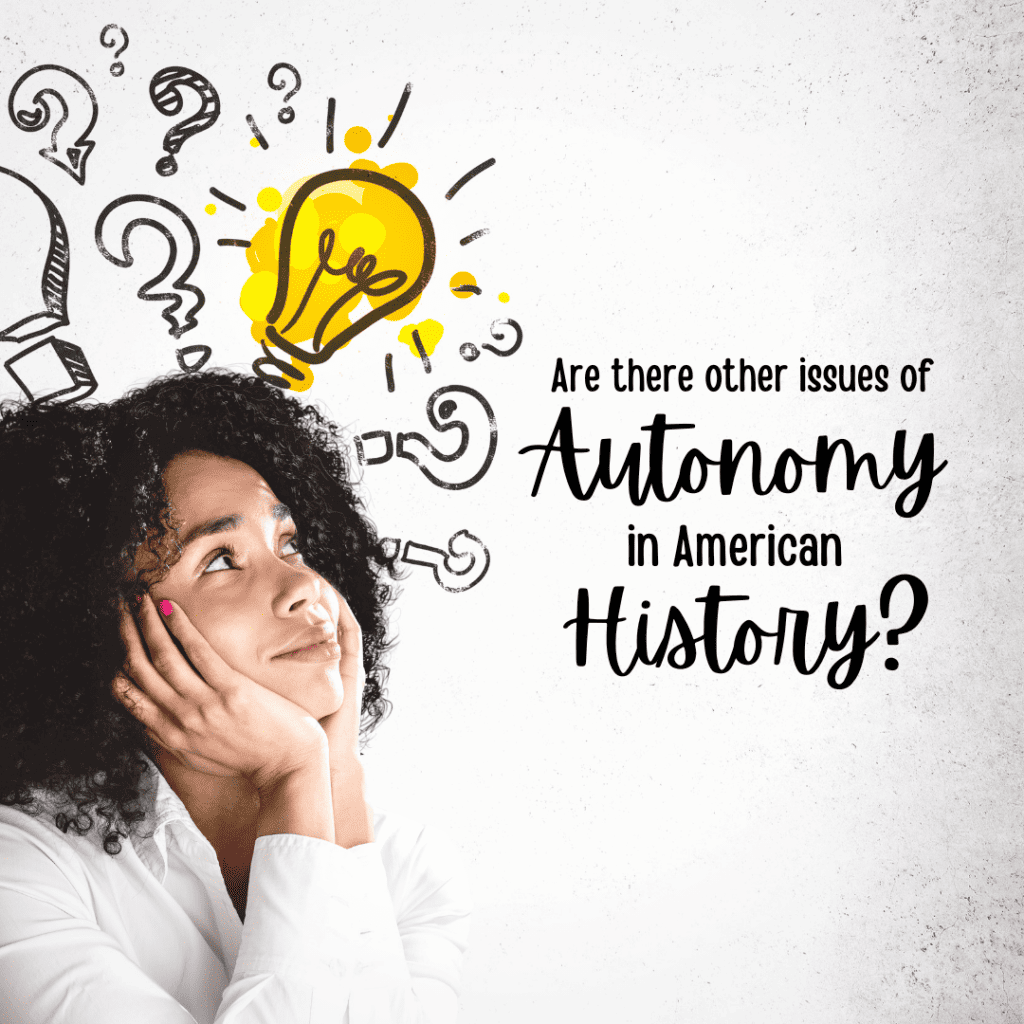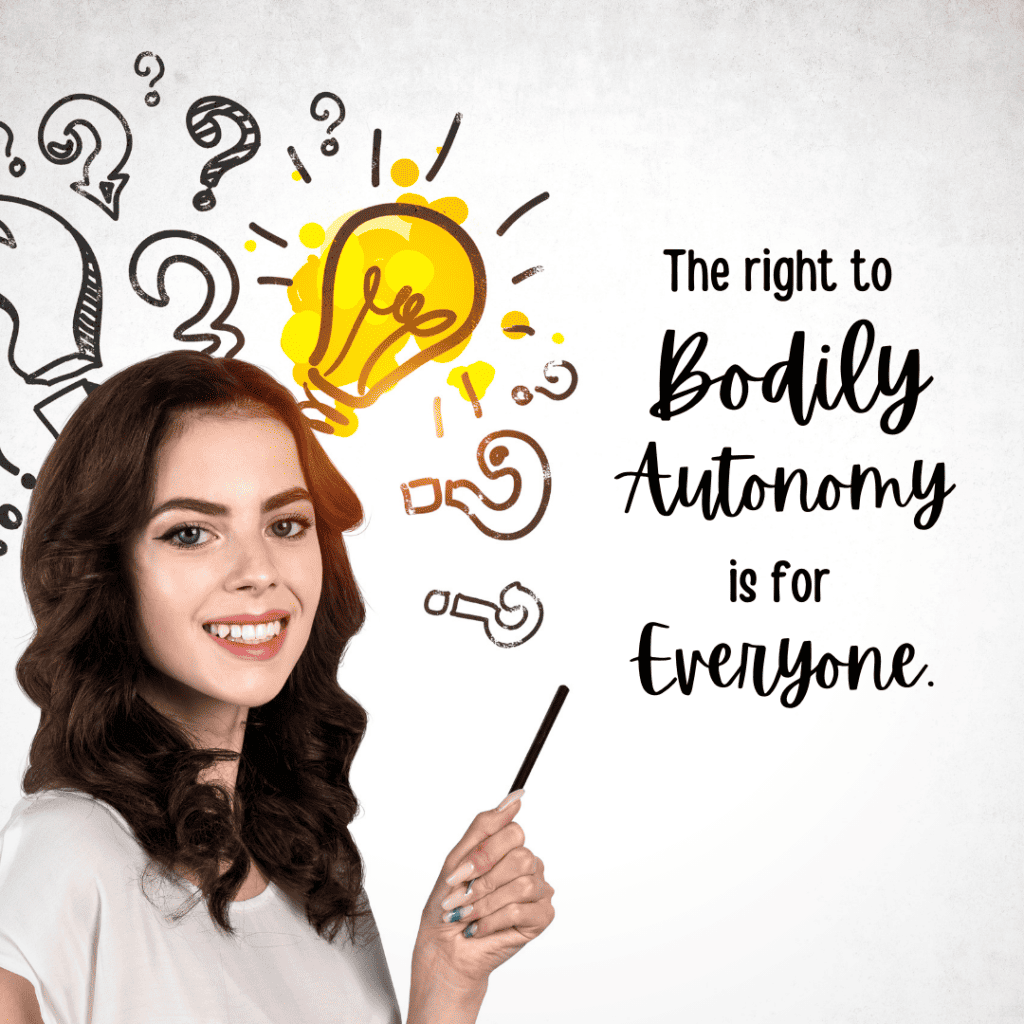If you’ve been in the pro-life space for any length of time, you’ve probably encountered the term, bodily autonomy. In my early college years, I went on a personal quest to try and figure out, for myself, if I was pro-life or pro-choice. After diligently searching for answers, I found an argument for being pro-choice that referenced this term. It felt right. I should have a choice over what happens to my body.
This argument, the right to bodily autonomy, isn’t about who deserves rights. Rather, it’s about where we draw the lines with those rights. When can my rights infringe upon someone else’s?
What is Bodily Autonomy?
Before discussing complex issues like abortion, it’s essential to understand what bodily autonomy is and what it isn’t.
While the term “bodily autonomy” is widely used when discussing abortion, Merriam-webster currently only defines the term in parts:
Autonomy (n): the quality or state of being self-governing.
Bodily (adj): of or relating to the body.
Synonymns you may find familiar include, bodily integrity, personal autonomy and self-ownership.

Together as “Bodily Autonomy,” this term roughly means “the quality or state of self-governing one’s own body.” Hence, the famous pro-choice phrase, “My Body, My Choice.”
Autonomy from the Pro-Choice Perspective
Often, when faced with the abortion issue, each side of the discussion is quick to fall back and grip tight to their core beliefs. For pro-lifers, it’s usually the belief that every human deserved the right to life. For pro-choicers, it’s usually the belief that pregnancy is an extension of a woman’s body. Therefore, it’s her right to decide what is done with that pregnancy.
In my early years of exploration, I found an articulate explanation of this argument in an online debate.

The Strongest Pro-Choice Argument
The example went something like this:
“One day, a man wakes up and finds himself hooked up, like a living blood transfusion, to a 7-year-old kid. He never gave his consent, and he’s never met the kid before in his life. Perhaps, the kid’s an extraordinary kid. Maybe he’s the next Leonardo Da Vinci, and his life is dependent on the man’s blood. If they unlink, the kid will die. While it might be considered selfish for the man to unlink himself, do we have the right to force that man to stay connected against his will?”
This metaphor falls extremely short of representing the nature of pregnancy and the impact of abortion. However, this illustration raises a reasonable question. If we replace the man with a mother and the 7-year-old with a preborn child conceived from a rape, this new metaphor is a famous argument among pro-choice advocates:
“Why would you force a woman to be a slave to her own body, or worse, another person?”
Cases concerning the right of an individual to govern one’s own body have cropped up in U.S. courts. For example, the case, McFall v Shimp, closed in favor of preserving autonomy. Knowing this, it stands to reason that it would be unconstitutional to force any person to submit their bodies as a slave to another, even if that person were the next Da Vinci or a beautiful preborn baby… right?
The Right To Personal Autonomy
Just as abortion is not discussed directly within the U.S. Constitution, neither are the words “Autonomy” and “Bodily Autonomy.” However, this does not mean that the Constitution does not cover issues related to personal autonomy.
Having autonomy over one’s body is an integral part of being a free person. Even the U.S. Constitution outlines our ability to self-govern things involving ourselves as individuals. There are several amendments that can help decipher questions about our right to bodily autonomy.

The 14th Amendment
The most popular amendment for defending “my body, my choice” is the 14th amendment.
"All persons born or naturalized in the United States, and subject to the jurisdiction thereof, are citizens of the United States and of the state wherein they reside. No state shall make or enforce any law which shall abridge the privileges or immunities of citizens of the United States; nor shall any state deprive any person of life, liberty, or property, without due process of law; nor deny to any person within its jurisdiction the equal protection of the laws."
Amendment XIV, Section 1
While the 14th amendment preserves the right to “life, liberty, and property,” it is argued that the preborn, those not yet “born or naturalized in the United States,” have no claim to these rights. Additionally, many claim that the intrusion of government into a woman’s womb is a violation of privacy. These types of actions were ruled illegal through such cases as Griswold v Connecticut and Roe v Wade.
In summary, these cases helped define the right of women to privacy when consulting a doctor on, and using, contraception. It is worth noting that since the days of cases like Roe v Wade, ultrasound technology has advanced by leaps and bounds. We now have a better idea of what and who is in the womb. Likewise, we now understand that abortion is not a contraceptive, neither by definition nor by practice.
The 13th Amendment
Less cited by pro-choice advocates, but just as weighty in explaining the importance of personal autonomy is The Thirteenth Amendment.
"Neither slavery nor involuntary servitude, except as a punishment for crime whereof the party shall have been duly convicted, shall exist within the United States, or any place subject to their jurisdiction."
Amendment XIII, Section 1
This amendment preserves autonomy for one party, those at risk of being slaves, and limits autonomy for another party, those who would be slave owners. The exception to this rule is if one person is deserving servitude as punishment (think convicts who are justly imprisoned for their crimes).
Similar Issues In History
The issue of bodily autonomy has come up previously in our nation’s history. Abraham Lincoln once presented an excellent case defining the complex nature of autonomy. In his address at Sanitary Fair in Baltimore, Maryland, he said:
“The shepherd drives the wolf from the sheep’s throat, for which the sheep thanks the shepherd as his liberator, while the wolf denounces him for the same act, as the destroyer of liberty …. Plainly, the sheep and the wolf are not agreed upon a definition of the word liberty; and precisely the same difference prevails to-day among us human creatures, even in the North, and all professing to love liberty.”
Of course, Lincoln was referring to slavery, the bodily autonomy case of his time. Lincon’s thoughts were that any liberty could have different and sometimes dangerous definitions. And these definitions tend to change, depending on who we ask.
Wolf or Sheep?
When seeking clarification on autonomy issues, do we ask the wolf, who thinks it’s his right to eat the sheep, or the sheep who’s at risk of being eaten? Make no mistake; neither a preborn child nor an abortion-minded woman is, in any way, equivalent to a prowling wolf. However, Lincoln’s illustration highlights the importance of weighing who stands to lose the most when limiting a person’s liberties.
The owner of an 1800’s plantation could have easily claimed that his purchasing an imported slave made that slave his property. He could have further argued, as many surely did, that the government’s involvement in what took place on his plantation was an invasion of privacy. The tipping point of this argument is that human life is not property to anyone but the sole owner of that life. That is the heart behind the Declaration of Independence‘s statement that “all men are created equal.” No one living being, despite his position of physical or political power, had the right to dominate another. By this founding principal, slavery was abolished and women’s suffrage was achieved.
Historically, when this foundational right to one’s own life is crossed, tragedy occurs. Reducing human life to property never results in equality and freedom. Rather, it’s often used to justify the mass taking of lives.
Consider if this is the case for the preborn. According to stats from Guttmacher Institute, the number of abortions in the U.S. have reached nearly 6.3 million. To put it into perspective, that’s more lives than the population of California and Florida combined.
These thoughts may lead us down a rabbit hole of questions: When does life begin? Should our rights begin when we do? Thankfully, there are clues to these answers, verified and demonstrated in the field of science and medicine.
Bodily Autonomy and Medicine
The problem with using bodily autonomy as a pro-choice argument is that it just as accurately defends the person within the womb as it does the person with the womb. While a woman could argue a pregnancy is an invasion of their bodily rights, a preborn child could argue the same.
In fact, most medical professionals acknowledge the individuality of mother and preborn child. Dr. William Lile has decades of experience in treating both pregnant and preborn patients. To the many students he’s educated, he presents a few interesting questions.

Dr. Lile's Case Studies
When discussing patient rights, Dr. Lile offers his students the chance to voice their opinions on real-life case studies. These conversations make interesting connections between the 14th Amendment and patient rights. The discussions go something like this:
“If somebody was not born here in the United States, but they needed a blood transfusion to save their life, are they entitled to that blood transfusion…?”
The students nod their heads in agreement. Then, Lile offers a second case:
“Well, what if this same patient, who wasn’t born in the United States, is going to die unless we do heart surgery?”
The students all nod their heads. Their reasoning is unanimous:
“It doesn’t matter if they were not born in the United States. If they’re going to die, that’s the role of our medical community; to defend them, protect them and provide them healthcare. It doesn’t matter if they were born in the United States or not. They are entitled to access healthcare. That is their right.”
Dr. Lile agrees, but then he takes the case one step further and the room gets quiete.
“All these patients were patients of mine …. The other thing they all have in common is that every one of these patients is still in the womb of their mother. They haven’t been born yet. Yeah, you just told me that patients have rights and that we need to respect patients because they are our patients. And a patient is a person.”
In the end, Dr. Lile’s point is that an individual rights should not be taken likely. When we approach the topic of human rights humanely and scientifically, we find that a pregnant womb holds a patient, a person, one entitled to respect and bodily integrity.
But how can we know what a preborn baby thinks?
If you’re going to advocate for one person’s rights to cross over into the rights of another, it’s crucial to give an equally weighted voice to both parties involved. But can we know what preborn children think about the abortion decision? Yes, and heartbreakingly so. Research on fetal pain in becoming increasingly clear that preborn children as early as 20 weeks (possibly earlier) can feel pain. There are also many documented occurrences of preborns physically responding to intrusions in the womb.
Dr. Lile also discusses how the medical field treats mothers and preborns as two different patients.
Dr. Lile discusses how mother and child are treated as two separate patients by medical professionals.
More Interviews with Dr. Lile:
Bodily Rights and Culture
In addition to being able to observe the objections of preborn infants, we also have the words of abortion survivors.
Oddly, the bodily harm brought upon survivors by invasive and unwelcome procedures in the womb are often ignored by the media. Sadly, those who are passionate about bodily autonomy offer little compassion towards those who suffer the life-long impact of having their right to bodily autonomy revoked.
The Faces of Choice commercial went unaired for giving voice to victims of abortion.
Lyric Gillett, founder of Faces of Choice, dedicates her time to restoring the right to bodily autonomy of the abortion-threatened. Back in 2020, Gillett sought to give voice to abortion survivors via a Super Bowl commercial. To her surprise, the commercial was denied air time despite containing neither graphic imagery nor the word “abortion”. In an interview with The Washington Times, Gillett pointed out how hypocritical American culture tends to be against those most impacted by the abortion issue:
“In an era where we’re trying to give survivors a voice, whether that is through the #MeToo movement or on any number of issues, for some reason we deem survivors of abortion worthy of being ignored into oblivion …. That, to me, is both ironic but also just appalling.”
Pregnancy, Abortion and Bodily Rights
But what about the many women who look to abortion for an answer during desperate times? What about the women who face adverse diagnosis pregnancies, ectopic pregnancies, conception after rape or incest, or pregnancy amid poverty? Good question!
When we discuss pregnancy, abortion, and bodily autonomy, it’s much more beneficial (to all parties involved) when we acknowledge that abortion is more than a choice. Abortion is the aftershock of bigger issues, ones with tempting gains and terrible losses.
This is why ending abortion isn’t as simple as overturning Roe v Wade or Doe v Bolton. Abortion is the devastating symptom of many other ailments: poverty, misinformation, hopelessness, trauma, loneliness, pain. Thankfully, it’s never too late to become what Lincoln referred to as “The shepherd.”
Pro-Life and Whole-Life
Becoming a “shepherd,” yourself isn’t as difficult as it may seem. The process of treating the root causes of abortion begin with the actions of compassion that you demonstrate in your local community. Check out this year’s See Life series to see how you and others can get involved in helping to restore and preserve the bodily integrity of those whose rights are at risk.

















